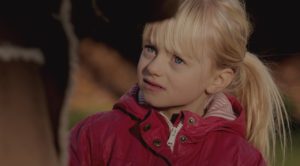Walking in another person’s shoes is nearly impossible until you are graced with the ability to see Rachel Shenton’s film “The Silent Child.” Directed by Chris Overton, Libby (Maisie Sly) is a deaf child, the youngest of three in a typical family, busy and pulled in many different directions. There’s little time for young Libby who will be attending school soon. A tutor, Joanne (Shenton), has been hired to help her get ready for school. The story takes us inside Libby’s world as Joanne unlocks the doors of communication, yet outside influences make this film heartbreakingly real.

Gorgeously shot, we are brought into this family’s world as we meet Joanne riding her bike along country roads to her new job—tutoring Libby. Familiar chaos is taking place at the breakfast table as everyone readies for their hectic day. Joanne is thrust into the situation as she meets Libby who is not only non-communicative, she avoids any interaction at all. It’s as if she is just existing in time and space and nothing more. Sue (Rachel Fielding), Libby’s mother, reassures Joanne of Libby’s ability to follow everything using lip reading. Now, this is where the filmmakers give us just a taste of Libby’s world as we see things from her silent and confusing perspective. Joanne then skillfully assesses the situation and begins to teach Libby sign language. As Libby begins to understand the world around her, the two are connected, reaffirming the necessity of communication. Sign language unlocks the solid doors that Libby has been kept behind and now her world has been opened. She begins to play, laugh, request things and share her thoughts with Joanne and her older siblings—all the things we take for granted. The guilt and self-protection we see in Sue is disturbing, yet understandable but begins to interfere with Libby’s progress. Quickly, we see how important this missing piece of the puzzle is for Libby in order to grow and learn, but without support, she will never reach her potential.
This short film conveys more heart and emotion than many full-length feature films. To understand a situation from someone else’s perspective elicits empathy and once this is established, anything is possible. “The Silent Child” powerfully places Libby’s shoes on us and creates heartbreaking empathy. Sly’s performance is haunting as we witness her coming to life and then watching disappointment wash over her like a dark cloud through which no rays of sunshine will ever break. We feel her pain and know what the future holds as our heart also breaks for Joanne, played expertly by Shenton. This vital and pivotal role in Libby’s life accentuates the importance of connections that occur. With stunning cinematography and the deft direction of Overton, it’s no wonder this film has won numerous festival awards.
“The Silent Child” brings into focus what it is like for a child who is deaf. We are able to be a part of her world and walk in her shoes if only for a moment as we redefine the importance of communication and language as powerful components in life, learning, and happiness. It’s a heartbreaking tale that unfortunately is not far from reality and an every day occurrence.
For more information about how to help a child with a hearing impairment, go to www.asha.org. As a former speech-language pathologist, I worked with children ages 0-3 who were hearing impaired. This film is a poignant demonstration for the need for support and education in this area.

